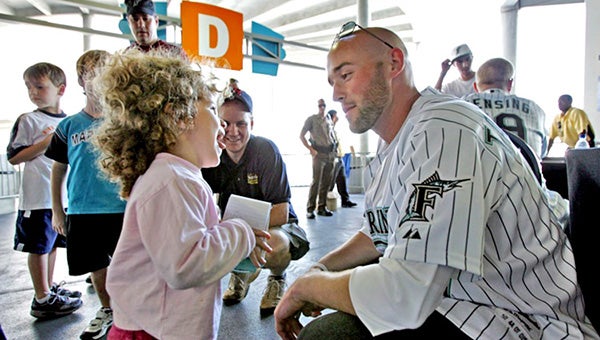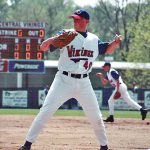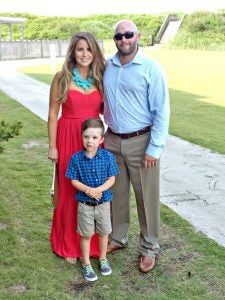Six years after retirement, Tankersley finds joy with family and second career
Published 12:13 pm Tuesday, July 4, 2017

- Former Warren Central baseball star Taylor Tankersley signs an autograph for a young fan while playing for the Florida Marlins in 2007. (Courtesy of Tom Tankersley)
It was 10 years ago this month that Taylor Tankersley witnessed, and then was nearly a part of, baseball history.
On July 27, 2007, San Francisco Giants slugger Barry Bonds hit the 754th home run of his career in the first inning against the Florida Marlins, bringing him within one of tying Hank Aaron on Major League Baseball’s all-time list.
Two walks and seven innings later, Bonds led off the bottom of the eighth inning still sitting on 754. Standing in his way was Tankersley, the Marlins’ left-handed relief specialist and former Warren Central star.
It was his duty to pitch to keep the Marlins in the game, and Bonds out of the record books, as a worldwide audience watched on ESPN late on a Friday night.
“I wasn’t scared to be the guy that gave up the record-breaker,” Tankersley recalled, nearly a decade after his showdown with the most fearsome hitter of his generation. “I was excited to be the guy that got him out.”
Road to the majors
These days, Tankersley works as a sales broker for a lumber company in North Carolina. Once upon a time, however, he was perhaps the best high school pitcher ever to play in Warren County and the first one ever picked in the first round of the Major League Baseball draft.
Tankersley’s road to the majors began in Vicksburg. He was part of a talented generation of players in the late 1990s and early 2000s that churned out six professional players and nearly two dozen college players in a six-year span.
Tankersley was the only one to reach the majors, but his peers included 2005 Ferriss Trophy winner Brian Pettway; Warren Central teammate Shea Douglas, who reached the Double-A level with the Cleveland Indians organization; and Vicksburg High standout Justin Henry, who got to the Triple-A level after playing six seasons of minor league ball. All of them graduated from Vicksburg or Warren Central between 1999 and 2003.
Eight of the nine starters on Warren Central’s 2001 Class 5A championship team played on at least the junior college level.

Taylor Tankersley throws the ball during his senior year of high school at Warren Central in 2001. (Courtesy of Tom Tankersley)
Tankersley said players of that era were inspired by parents who devoted their time to help them succeed, and a culture that inspired a love of baseball.
Taylor Tankersley throws the ball during his senior year of high school at Warren Central in 2001. (Courtesy of Tom Tankersley)
“We’d go out to Warren Central on a Sunday afternoon, and there’s one dad throwing in the cage and another one throwing on the field,” Tankersley said. “We played together from 11 or 12 years old all the way through high school. My favorite year of my entire career is my senior year of high school, because we all did it together. There is no greater feat I’ve ever accomplished on a baseball field than winning a state championship with the Warren Central Vikings.”
Tankersley’s 2001 season was one for the ages. Not only did he lead Warren Central to its first baseball state championship — as well as a 36-3 record and No. 4 national ranking by USA Today — he was almost perfect in doing it.
Mixing a devastating, 66 mph 12 o’clock to 6 o’clock curveball with a fastball approaching 90 mph, the left-hander had a perfect 13-0 record and struck out 165 batters in 95 innings. He had an ERA of 0.44 and, although he did walk 32 batters, he also had a devastatingly effective pickoff move that erased many of them from the basepaths.
Tankersley was drafted by the Kansas City Royals in the 38th round in 2001, but turned down their offer and instead went to play at Alabama. Three years later he became the first player from Warren County ever selected in the first round when the Marlins took him with the 27th overall pick in the 2004 draft.
“I was a product of my environment,” Tankersley said. “I thought I was special, and as I look back I realize I was part of a special group.”
The Big League Life
It took Tankersley less than two full professional seasons to reach the major leagues. He was called up by the Marlins on June 1, 2006 and made his big league debut two days later against the Colorado Rockies.
Tankersley pitched one scoreless inning in the Marlins’ 13-0 win at Coors Field, allowing one hit but also recording the first of his 115 career strikeouts.
It was the start of a less-than-glamorous major league career, in an often thankless role as a middle reliever.
Tankersley quickly settled into the role of lefty specialist. His job was to come in from the bullpen and throw an inning or two, usually to get a tough left-handed hitter out. For a time, he did it pretty well.
In his rookie season in 2006, Tankersley had three saves and a 2.85 ERA in 49 appearances. He also ranked eighth in the National League with 22 holds, the middle reliever’s equivalent of a save.
He pitched in 67 games in 2007 and had one save, a 3.99 ERA and 16 holds.
In 168 career appearances, his longest outing was one two-inning stint against the Atlanta Braves in 2006.
“My dream was never to be a hall of famer or a major league all-star. My dream was never to make a career out of pitching,” Tankersley said. “My dream was that I could square up with the best in the world and get the job done.”
That included Bonds, who Tankersley crossed paths with on that July night at AT&T Park in late July 2007.
When asked about the encounter, Tankersley at first didn’t seem to give it much thought. A moment later, however, he recalled every pitch in the sequence with pinpoint accuracy.
“I got ahead of him 0-and-2 and then I walked him,” Tankersley said, a hint of disappointment in his voice. “I wasn’t scared of him. I was excited for the challenge. The thing that was going through my was, ‘He can’t hit me.’”
After getting ahead in the count, Tankersley threw four consecutive balls to put Bonds on base. The fans booed as they missed a chance to witness history, and internally Tankersley was booing himself at a missed opportunity to strike out a legend.
“You tell yourself, ‘I’ve got him now,’” Tankersley said. “I got way too pumped up. Spiked a curveball, missed with a fastball, and then spiked another curveball. Then I threw ball four.”
Tankersley struck out the next batter, Ryan Klesko, and then did get Bonds out when Pedro Feliz hit into an inning-ending double play.
Bonds tied Aaron a week later and passed him on Aug. 7 against the Washington Nationals.
Three weeks after they squared off in San Francisco, Tankersley got another crack at Bonds when the Marlins and Giants played in Miami. Tankersley struck him out looking on four pitches — the last three were called strikes — to end the seventh inning.
“A couple of weeks later the Giants came to Miami and I struck him out,” Tankersley said. “I wish I could have struck him out when he was sitting on the record.”
The road gets rocky
The 2007 season turned out to be the high point of a brief major league career for Tankersley.
He struggled with his control and an elbow injury in 2008, and his ERA ballooned to 8.15 in just 25 appearances. In 17 2/3 innings, he gave up 22 hits and six home runs. In his first two seasons combined, he had allowed eight home runs in 88 1/3 innings.
For the first time in a long time, Tankersley had to deal with his own baseball mortality and the consequences of living life on the edge.
“As a middle reliever, as a left-hander out of the bullpen, every single day you go to work you are the 25th man on a 25-man roster,” he said. “A good week means you keep your job for another week. A bad week means you get sent to Triple-A. I maxed out with the abilities I was given. I was never going to be a major league closer or a starter. I was a fringe major leaguer. When I had my A-game, I could be a major leaguer. When I had my B-game I needed luck. When I had my C-game, I was a minor leaguer.”
The elbow injury that had started Tankersley’s slide soon became a bigger issue. After throwing one scoreless inning against the Mets on July 29 — his first appearance in a game in three weeks — the pitcher who had endeared himself to Marlins fans with a fiery attitude and Fu Manchu mustache was quietly sent down to Triple-A Albuquerque to make room on the roster for another journeyman reliever, Arthur Rhodes.
Tankersley finished the season in Triple-A and then missed all of the 2009 season with his elbow injury. He made it back to the majors in 2010, but struggled again. He had a 7.50 ERA in just 27 appearances.
He was granted free agency by the Marlins at the end of the season and signed with the Mets in January 2011. He pitched in 48 games for their Triple-A team in Buffalo but never got back to the majors.
The Mets released Tankersley in November 2011, one quiet offseason transaction among dozens that brought an end to a once-promising career. The former first-round draft pick was out of baseball at the age of 29.
“My last year of professional baseball, I got my butt kicked a lot,” Tankersley said. “The stuff just wasn’t there. I knew. I was very fortunate that the last game I played, I closed out the game with a 1-2-3 inning. I sat in the dugout for a while. I just felt it. This was the last time I’m going to be able to competitively throw a baseball.”
Life after baseball
Cast into a world without baseball for the first time since he was 6 years old, Tankersley admits he wasn’t quite sure what to do.
“That was hard,” he said. “I threw a pity party for myself for a little bit.”
Eventually he snapped out of his funk and returned to his roots — not in Vicksburg, but in central North Carolina.
Back when his career was just getting started, in 2005, Tankersley spent part of the season with the Class A Greensboro Grasshoppers of the Carolina League. It was there that he met a pretty young brown-haired woman named Lauren, and the two soon fell in love.
“We met for dinner the night before the (2006) season started, and I said, ‘This is it. You’re the one for me,’” Tankersley said. “She kind of agreed, thankfully.”

Former Warren Central baseball star Taylor Tankersley stands alongside his wife Lauren and their son Huck at their home in North Carolina. (Courtesy of the Tankersley family)
Lauren and Taylor were married in November 2007 and spent the offseasons in her native North Carolina. After Taylor retired from baseball in 2011, they settled and had a son named Huck, who is now 6 years old.
For a time, Taylor thought about continuing with a life in baseball. He taught private lessons and coached some youth teams upon leaving the game as a player. And, with a major league stint on his resumé and connections from his college days at Alabama, landing a high school or college coaching job would likely have taken just a couple of phone calls.
It wasn’t long, however, before the reality of what that would entail actually dawned on him.
More long nights. More travel. More time away from home and family.
Former Warren Central baseball star Taylor Tankersley stands alongside his wife Lauren and their son Huck at their home in North Carolina. (Courtesy of the Tankersley family)
“I came to the realization that that would be continuing my dream,” he said. “If I want to keep my family in one place I can coach high school or be a pitching coach in the SEC, but I’m coaching somebody else’s kids and not mine. If you move up the ladder, you’re going to move around a lot and be gone. It got to a point where it was, ‘What is my dream for my family?’ It’s to be home for dinner and to be around for them.”
That moment of clarity led Tankersley from a career of trying to saw off the lumber in the hands of opposing batters, to selling it to customers.
A chance encounter at a Christmas party put him in touch with an executive at East Coast Lumber Company who offered him a job. Tankersley’s second career is as a lumber broker who handles sales between the sawmill and manufacturers of things like wood pallets and furniture.
Tankersley said he enjoys his job a lot, but admitted that it lacked the glitz and glamour of pitching in front of 40,000 people on a nightly basis.
“To be able to throw a baseball for a living and get paid for it is a very cool thing. I had to wrap my head around the fact that I was no longer special,” he said. “The lumber industry is a wonderful industry because it’s filled with a lot of great, salt of the earth people. But there’s nobody that buys a ticket to stand in the office and watch me buy lumber.”
Over time, Tankersley said, he’s made peace with his career. It had enough high points to be satisfied, even if the ending made it hard to watch baseball for several years. He said it was just this season that he’s been able to enjoy the game as a fan.
For several glorious years, however, he was part of the game at a level few people reach. Whether he was the 25th man on the roster or the first, he lived his dream of facing — and beating — the best in the world.
“My dream was that I could get the best hitters in the world out. And I did,” Tankersley said. “The further I get away from it, I’m OK with that. I’m proud that I did that.”






